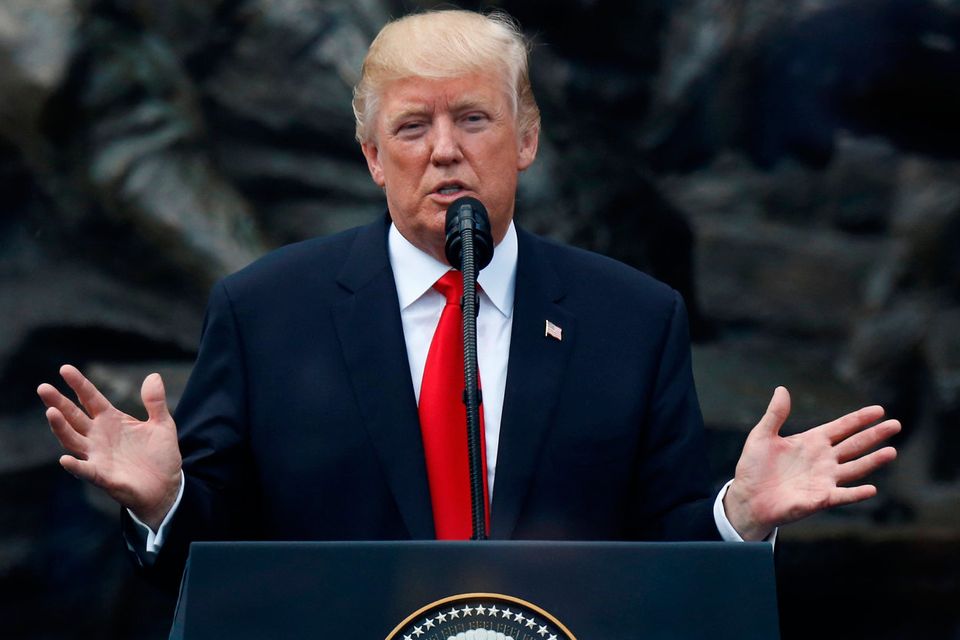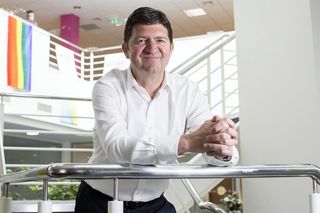Letters to the Editor: Trump praises outlier Poland - still untouched by terrorism
US President Donald Trump makes a speech in Warsaw on Thursday. Photo: Reuters
I refer to US President Donald Trump's speech in Warsaw this week where, in his admiration for Poland and its centuries-long fight for nationhood, he called the Poles a people "who have never, ever forgotten who they are".
In stressing Polish strength in "spirit" and "identity", making reference to the Warsaw Uprising and Pope John Paul II, Mr Trump was addressing the West's own survival in the face of what he perceived as outside threats to its civilisation.
This is in contrast to his predecessor, Barack Obama, who rejected any suggestion of a "clash of civilisations" in reference to Islam and America at a speech at the United Nations General Assembly on September 24, 2014, arguing there was no "us and them", just "us".
As evident by the enthusiastic crowd attending Mr Trump's speech, shouting his name, Poland is a conservative outlier compared to Western Europe, with its ruling party Law and Justice putting forward positions that are populist and culturally conservative.
Poland shares Mr Trump's advocacy for tighter borders, having rejected Muslim refugees, attracting the ire of the EU (albeit it did take in Ukrainian refugees).
Curiously, Poland is also an outlier when it comes to terrorism, having not experienced a single jihadi attack.
Stephen Oliver Murray
Ballsbridge, Dublin 4
Girl's case does not support Repeal
The case of the pregnant teenage girl who was detained under the Mental Health Act does not lend itself as support for those who advocate for wider availability of abortion ('Abortion order teenager gives birth at seven months', Irish Independent, July 1).
The girl was not detained in order to prevent her from obtaining an abortion, as some abortion proponents have suggested. She was detained briefly to ensure that she received necessary medical treatment. She was discharged by court order when the psychiatrists agreed that she was not suicidal.
The happy outcome of the case, with the early delivery of the baby, now reported to be living with the girl and her mother, should silence those who used the case to argue for the wider availability of abortion. If not, perhaps they will explain their position to the child when it reaches adulthood.
Daniel Donnelly
Dublin 6
Fiona nailed it on the middle class
Fiona Barry's letter (Irish Independent, July 6) outlining the characteristics of being middle class in Ireland is superb.
The four characteristics outlined could not be more correct. How many more of our young, highly educated workers are planning an escape? I agree with Fiona, it is, sadly, a badge of shame to part of middle class Ireland in 2017.
Margaret Docherty
Terenure, Dublin 6w
Sexist nature of our cancer service
An expanded National Cancer Screening programme has just been announced by the Health Minister. It is astonishing the level of discrimination on the basis of gender.
The most common type of cancer in women (breast) is screened, whereas there is no screening for the comparable cancer (prostrate) in men. Indeed, men get breast cancer also.
Imagine if the roles were reversed and there was a national screening campaign only for prostate cancer?
Brendan Chapman
Booterstown, Co Dublin
Don't ask us to join Brexit travesty
William Shortland is advocating that we in this country "demand autonomy from the EU to enable us to work out our own arrangements with the UK" (Irish Independent, Letters, July 6).
He obviously forgets that the centuries-old 'arrangements' with the UK did not work out too well and that the 'arrangements' worked out in 1922 were not great either.
Since joining the EU in 1973, we have benefited by having access to a large market - currently of 500 million people. We have also gained a net €43bn from the common policies of the EU. A UK 'think tank' is quoted recently as saying that by voting for Brexit the people of the UK have "massively damaged economic relations between the two countries".
By voting for Brexit, the UK has declared economic war on this country. Despite that, like William Shortland, that UK think tank advises that Ireland should consider leaving the EU. It is not quoted as saying we should rejoin the UK, but the implication is clear.
They want us to follow them in tearing up the agreement they signed with their fellow European citizens to join the EU. The EU represents the co-operation of nearly 30 European democracies in matters of mutual interest. It replaces centuries of imperial and totalitarian conflict in Europe and is the most advanced example of such co-operation in the world.
In contrast to Mr Shortland, all Ireland can say to the UK in reply is "No, we will not tear up that agreement" - but we should also respectfully suggest that the UK reverse what Mr Shortland called a "national disaster" for this country and what the UK's own think tank defines as the "massively damaging" Brexit decision.
A Leavy
Sutton, Dublin 13
Tips for the art of letter-writing
Please may I share some writing advice from Colum McCann's excellent book 'Letters to a Young Writer': Do not be afraid of sentiment even when others call it sentimentality. Be ready to get ripped to pieces: it happens. Do not allow your heart to harden. Have trust in the staying power of what is good. Have courage. Go somewhere nobody else has gone. Read promiscuously. Restore what has been ridiculed by others. Make justice from reality. Satisfy the appetite for seriousness and joy.
Brian McDevitt
Glenties, Co Donegal
Getting into a jam as a youth
As I drive around this time of year, I see an increasing number of young school children standing around their local shopping centre car parks.
It brings me back to the days of my youth in the 1960s, when each day we (about 20 of us) made our way on foot to Lambs' fruit farm, the Quaker jam manufacturers.
We spent the day picking berries and later walked home, handed over the money we earned, and had our dinner. Great memories.
Damien Carroll
Kingswood, Dublin 24
Taxpayer paying twice for RTÉ
So RTÉ sells a portion of its grounds that effectively belong to the taxpayer via the State. The purchasers borrow the cost from the taxpayer-backed fund. Am I going mad here? Is the citizen a bar code that's just swiped every time the establishment needs a dig-out?
John Cuffe
Dunboyne, Co Meath
Join the Irish Independent WhatsApp channel
Stay up to date with all the latest news















